Common Diseases Caused by Parasites and their Symptoms

Parasitic infections are a major concern in tropical and sub-tropical areas across the world. These types of infections can spread through contaminated water, food, a waste product, blood and many other ways.
Want to know more about diseases caused by parasites? Read the following section to understand parasitic infection, causes, symptoms, and treatment.

Table of Contents

What Is a Parasitic Infection?

Parasites are organisms that live on or inside an organism (host) and survive at the host’s expense. It means parasites benefit from the host by getting nutrients for their survival.
Parasites can be of different sizes, such as microscopic or large enough to be seen through naked eyes. These parasites can grow, breed, and infect other organs, leading to parasitic infection and, in worst cases, sepsis.
Sepsis can occur from infections such as urinary tract infection and pneumonia. A report says one-third of the population (globally) who have sepsis die. Those who survive suffer from life-changing organ malfunction, post-traumatic stress disorder (PTSD), or amputation.
Now that the basic definition of parasitic infection is clear to individuals let’s focus on causes, symptoms, risk factors, treatment, prevention and other areas.
What are the Causes of Parasitic Infections?
Parasitic infections originate from organisms that inhabit or reside within a host body, which mostly cause various health problems. Such cases of infection can be transmitted through the following:
- Contaminated Food or Water: Consuming food or water that has been infected by parasites as a result of poor handling.
- Insect Bites: Receiving mosquito, tick, or flea bites from insects having parasites in them that directly pump into the bloodstream.
- Poor Sanitation: Living and working in insufficient sanitation where animal or human waste can disseminate parasitic organisms.
- Direct Contact: Meeting affected persons and contaminated surfaces may lead to parasite transfer through touching skin or open wounds.
- Inadequate Hygiene: Proper personal hygiene, such as not washing hands regularly, can spread parasitic infections.
- Areas with Endemic Diseases: If no prevention methods are undertaken, the exposure risks are always higher in places where parasitic infections are widespread.
- Uncooked or Half-cooked Food: Consuming uncooked fish, meat, and other foods may result in parasite consumption.
- Infected Animals: Being near or touching animals with parasites, like pets and livestock, can cause you to become infected.
6 Diseases Caused by Parasites in Humans
Parasitic diseases in humans are those caused by parasites infecting the body and resulting in various health problems. Common parasitic diseases include:
1. Malaria
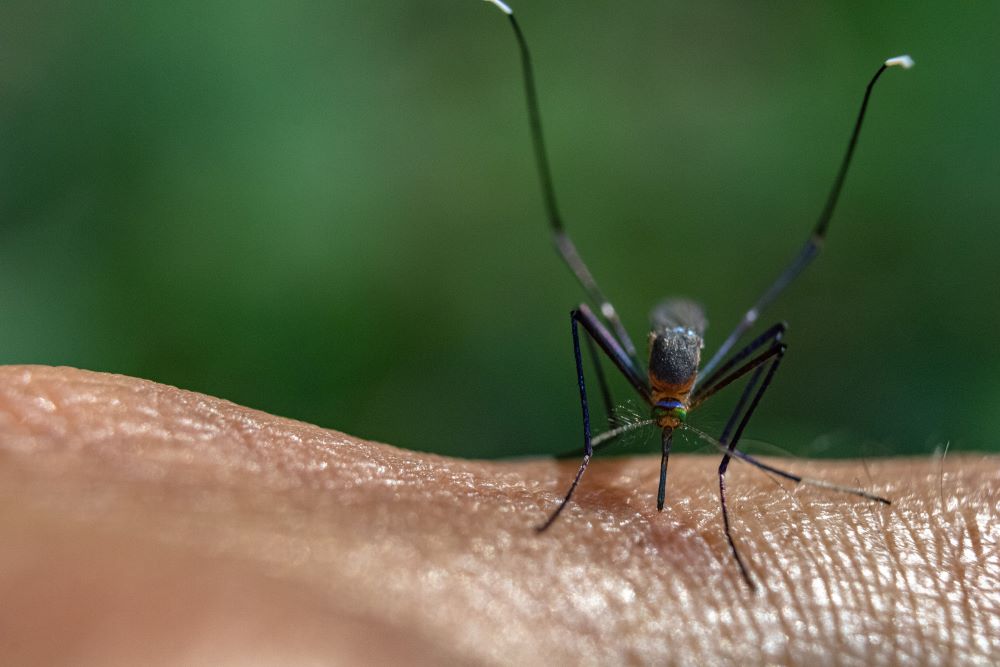
Plasmodium parasites, commonly transmitted by Anopheles mosquitoes, cause malaria. The organisms increase rapidly in the liver before invading red blood cells, leading to symptoms such as fevers, chills, sweating, etc.
Some severe cases can have complications like asthma, anaemia, and organ failures, among others, while untreated malaria can be fatal if not treated in time. Areas mostly affected by malaria are tropical and subtropical regions.
2. Amoebiasis
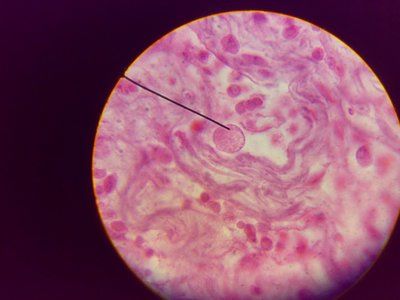
Amoebiasis is a gut infection caused by the Entamoeba histolytica parasite, frequently passed on through infected food or drink. If the parasite contaminates the lining of the intestines, symptoms may include intense diarrhoea, abdominal pain, bloody stools, etc.
If left unattended, amoebiasis could cause severe dehydration alongside other complications, thereby necessitating early diagnosis and treatment.
3. Giardiasis
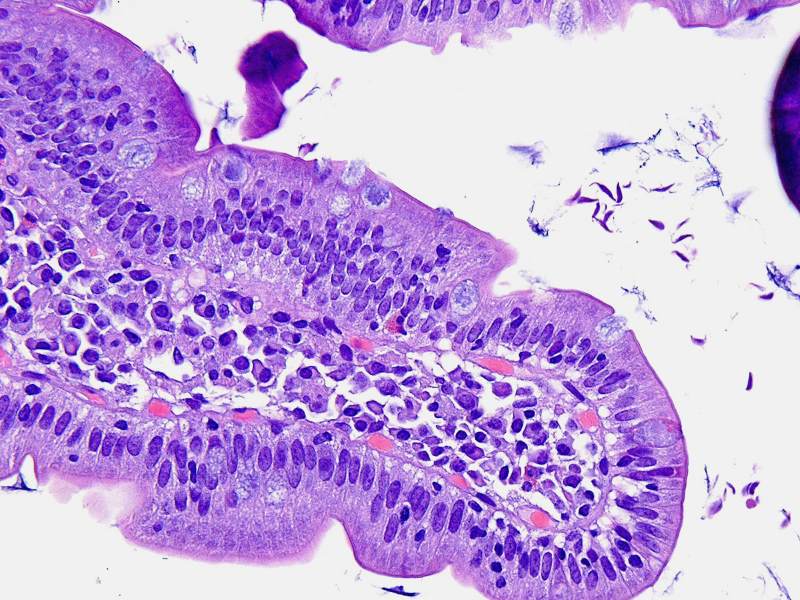
Giardiasis is a widespread parasitic infection transmitted in water and caused by the protozoa parasite lamblia giardia. It is spread through the consumption of contaminated food or drink, mainly causing symptoms like diarrhoea, bloating, nausea, and stomach cramps due to gastrointestinal complications.
The disease can lead to malnutrition and subsequent weight loss if not treated. The disease may last over two weeks, but treatment is usually successful.
4. Schistosomiasis
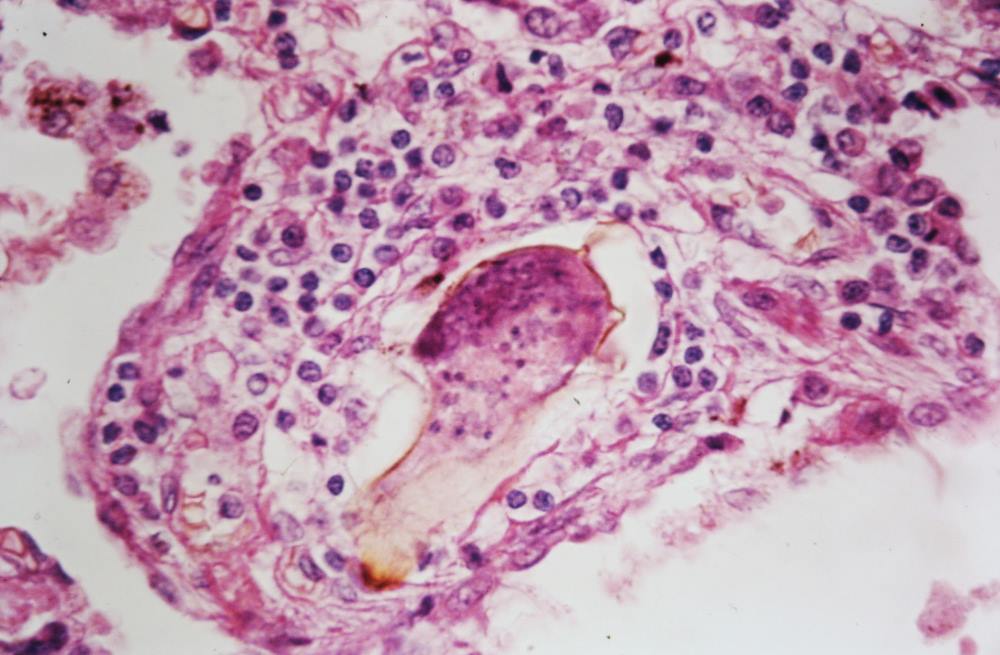
This illness results from schistosomes, parasites transmitted by freshwater snails. When humans come into contact with infested water, the larvae enter their skin surface and infect them.
Schistosomiasis can cause symptoms like rash, fever, chills, and muscle pains during its early stages. If it is not controlled, it can cause chronic conditions such as liver cirrhosis, kidney failure, infertility, and cancer of the bladder.
5. Toxoplasmosis
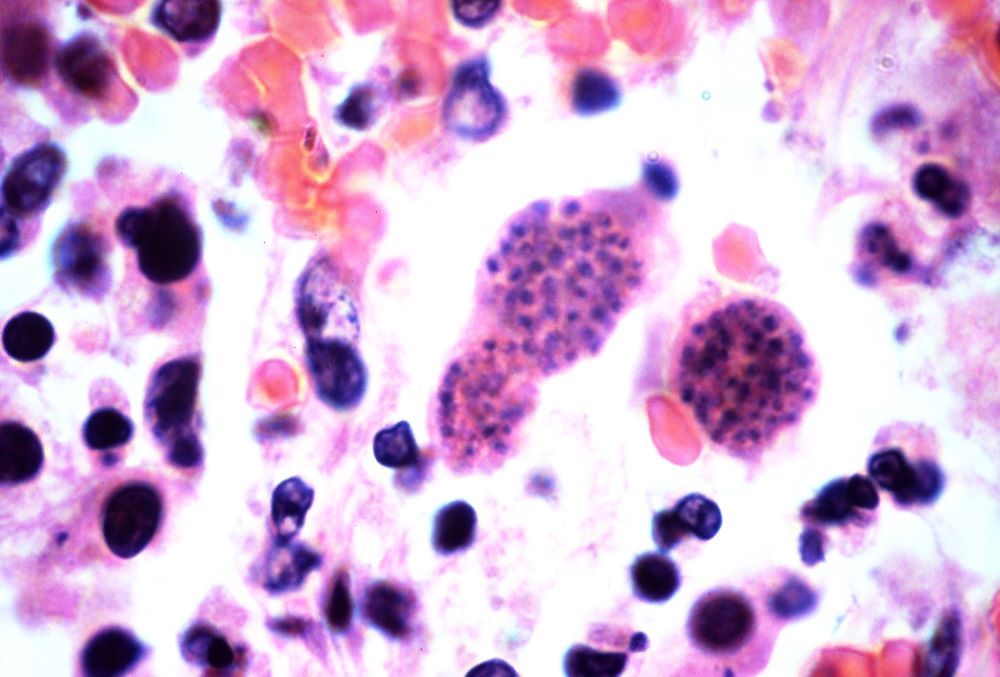
The parasite Toxoplasma gondii causes it, and it can be transmitted by undercooked meat, polluted water, or contact with cat faeces. Although many infected people do not have any symptoms of the disease, others may suffer from flu-like effects.
This infection can pass on to the unborn child in women who become pregnant, causing severe complications, such as miscarriages, stillbirths, and congenital defects.
6. Trichinosis
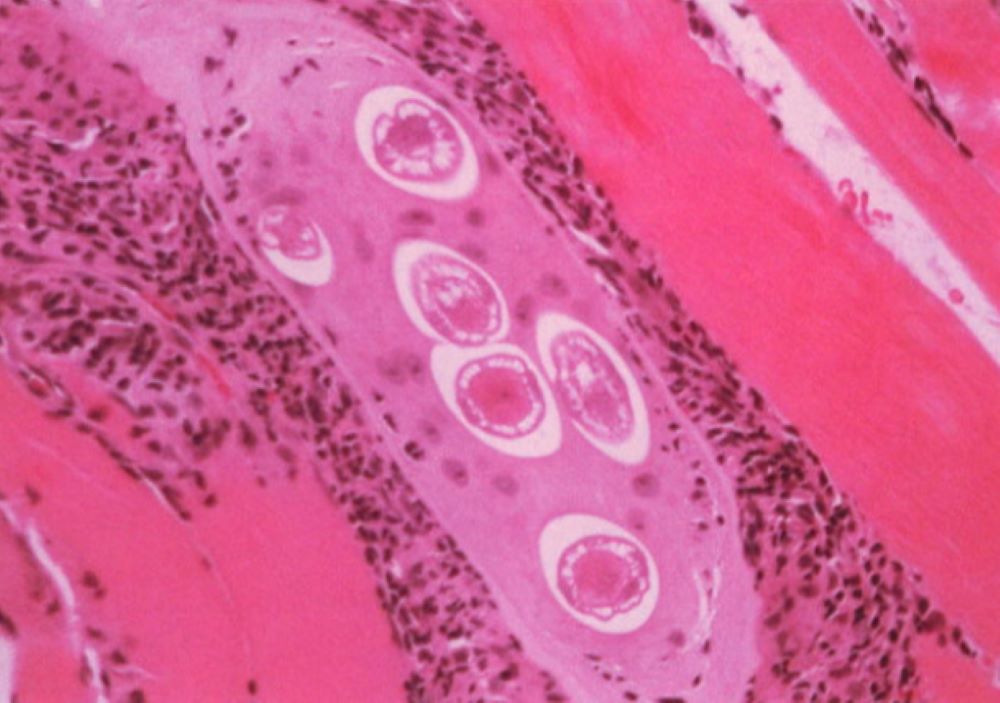
Trichinosis arises from consuming uncooked meats, mainly pork meats, infested with worms’ larvae called Trichinella. The symptoms include muscle aches, fever, and enlarging of the skin around the eyes due to the migration of the larvae into muscles.
In very dangerous cases, this can result in breathing difficulties, art disease, and even death if the infection affects the heart or brain. Cooking meat to the right temperature is crucial for preventing this ailment.
Which Worms Commonly Cause Parasitic Infection?
Below is a list of worms that commonly causes parasitic infection,
- Flatworms (e.g., Tapeworm, Flukes)
- Roundworms (e.g., Hookworms, Pinworms/Threadworms, Trichinosis).
1. Flatworms
- Tapeworms: These are elongated flatworms that inhabit the intestines of humans and animals. Taenia saginata (beef tapeworm) and Taenia solium (pork tapeworm) are common types. A person becomes infected with them by consuming raw meat.
- Flukes: They are leaf-shaped worms that infest organs such as blood vessels and liver. Examples include Fasciola hepatica (liver fluke) and Schistosoma spp. (blood fluke). Infection is frequently caused by polluted water or food.
2. Roundworms
- Hookworms: These are small worms that invade the body through the skin from dirty soil. Some species, such as Ancylostoma duodenale and Necator americanus, can cause anaemia and abdominal pain.
- Pinworms/Threadworms: These are small worms like Enterobius vermicularis that live in the large intestine and rectum. They are known for causing severe itching around the anal area, which can lead to discomfort and irritation.
- Trichinosis: Trichinella spiralis causes this disease when people eat raw meat. The symptoms include fever along with muscular pains and even swelling of the face, as well as difficulty in breathing.
What Are the Symptoms of Parasitic Infections?

Depending on the organism living on or inside the host, the common diseases caused by parasites and their symptoms may vary. The generic symptoms include:
- Nausea
- Weight loss
- General weakness
- Lack of appetite
- Diarrhoea
- Abdominal pain
- Lumps or bumps
- Allergic reaction
- Itchy rash
- Fatigue
- Anaemia
- Fever and headache
- Light sensitivity
- Conjunctivitis
- Muscle pain and tenderness
- Swelling of the face
Damages Caused by Parasites in Humans
Different organs and systems of parasitic injury can significantly harm the human body. Understanding the potential injuries they cause is important to prevent and treat effectively.
- Severe anaemia can be caused by Plasmodium (malaria) parasites, which destroy red blood cells, leading to organ damage, particularly to the liver and spleen.
- Nutrient absorption, such as giardiasis and hookworm infections, can lead to malnutrition and weight loss, especially in children.
- Some parasites invade tissues and organs in humans with schistosomiasis, which results from potential chronic conditions and possible organ failure.
- Parasitic infections can weaken the immune system, increasing the body’s susceptibility to other diseases or infections.
- In rare cases, Toxoplasma gondii parasites may reach the brain, resulting in neurological disorders like seizures, behaviour changes, or cognitive impairments.
- In severe cases, Ascaris lumbricoides (roundworm) causes respiratory problems, including coughing and wheezing, while pneumonia is a common result when these parasites migrate into the lungs.
- Chronic malaria or Chagas disease can cause prolonged fatigue and weakness, which can greatly affect an individual’s quality of life.
- Leishmania parasites such as cutaneous leishmaniasis may lead to severe skin lesions, resulting in ulcers or disfigurement.
Who Is at Risk of Getting a Parasitic Infection?
Parasitic infection can develop in any individual, but some individuals have a greater risk of getting affected. They are:
- Individuals who have a poor immune system or suffer from other illnesses.
- Individuals who nurture a habit of swimming in rivers, lakes or ponds where parasites like Giardia or other variants are usually found.
- People living in areas that do not get a supply of clean drinking water.
- Individuals living in tropical or sub-tropical regions or frequently travel there.
- Individuals whose profession (such as childcare, soil-related work) involves coming into contact with faeces regularly.
Further, individuals who have pets like cats have higher chances of developing parasitic infection as these cats come into contact with infected birds or rodents during outdoor activities. Wondering how?
Cat owners can contact a certain type of protozoa named Toxoplasmosis. Toxoplasmosis related infections can spread through cat faeces and are very dangerous for pregnant women and developing babies. Hence, to avoid such infections, cat owners must clean litter boxes on a regular basis.
What Are the Different Types of Parasites Causing Diseases in Humans?
Three types of organisms are primarily responsible for diseases caused by parasites in humans. These are as follows,
- Protozoa
- Ectoparasites
- Helminths
What Are the Methods to Diagnose Parasitic Infection?
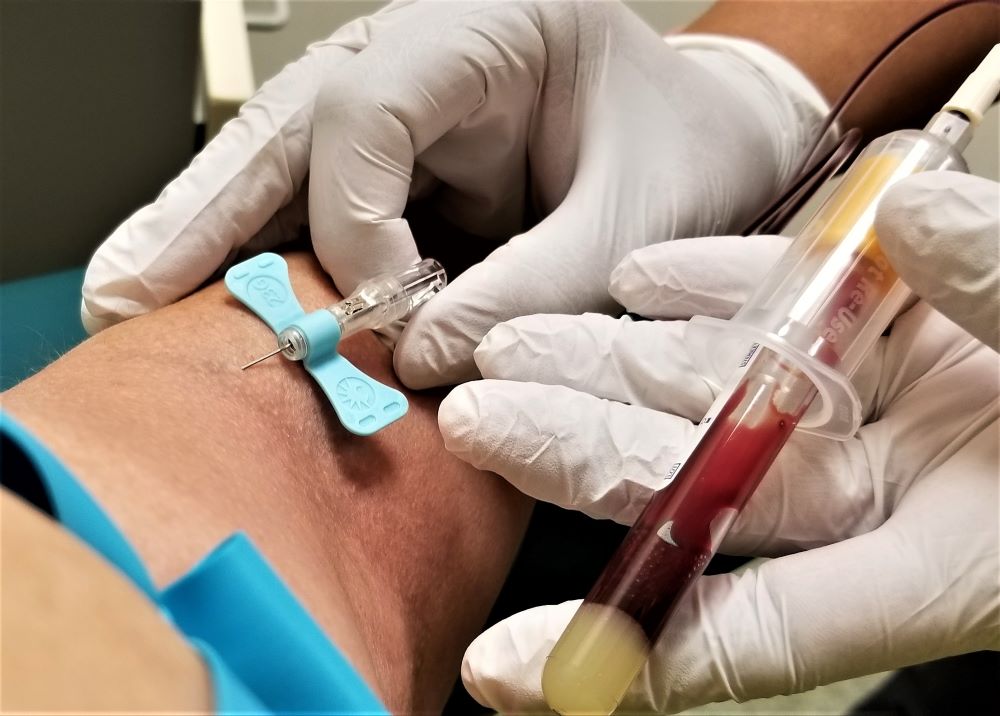
There are several ways doctors can diagnose diseases caused by parasites. These are as follows,
How Are Parasitic Infections Treated?
The treatment of parasitic infection depends on the type of infection and the report of diagnosis. In such cases, doctors usually prescribe medication. For instance, doctors prescribe medications to treat infections such as Giardiasis, Cryptosporidiosis, Trichomoniasis etc.
On the other hand, doctors do not prescribe medication to treat Toxoplasmosis for pregnant women unless they have severe infections.
Further, doctors may recommend surgery and additional medications in case of severe parasitic infection where infections have invaded other organs.
Additionally, doctors can recommend other modes of treatment to reduce parasitic infection-related symptoms. For instance, several parasitic infections can cause diarrhoea, further resulting in dehydration. Doctors may recommend drinking more water or fluid to balance bodily liquid in such cases.
How to Prevent Parasitic Infection?

To prevent parasitic infection, individuals have to follow safety measures. These are as follows,
- Avoid eating raw or undercooked meat, fish, or poultry.
- Regularly disinfect utensils, all cutting boards, and other cooking materials that came into contact with raw meat.
- Do not eat watercress or other raw freshwater plants.
- Avoid cross-contamination while preparing food, especially meat.
- Do not walk barefoot, especially in those places where soil may come into contact with animal faeces.
- Clean up animal waste.
- Do not come near cat litter and faeces, especially during pregnancy.
- Wash your hands frequently while touching uncooked food or handling faeces.
- Do not cook food at a lower than recommended internal temperature.
- Always drink clean water. While travelling, make sure you drink bottled water.
- Be careful while swimming in lakes, streams, or ponds and avoid swallowing water from there.
The above-mentioned piece gives a detailed overview of the diseases caused by parasites. Read these details carefully and contact a doctor if you start experiencing any of the symptoms mentioned above.
Does Health Insurance Cover Parasitic Infections?
Health insurance coverage for diseases caused by parasites will typically enable the following acts: diagnosis, medicine, and advice from a medical expert in charge. Most schemes will take care of costs related to diagnosing and treating parasitic infections, such as lab tests and prescription drugs.
However, coverage specifics might differ based on the insurance company and policy details, so reviewing your plan for any restrictions or conditions is important.
In conclusion, parasites can cause various ailments that impact general health and well-being. The above-mentioned piece gives a detailed overview of the diseases caused by parasites. Read these details carefully and contact a doctor if you start experiencing any of the symptoms mentioned above. Recognising the symptoms and knowing the possible dangers involved in these infections is essential for prompt identification and treatment.














